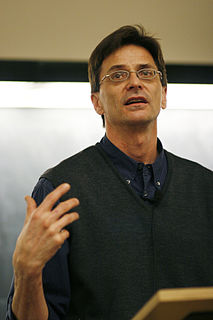A Quote by Robert A. Burton
Certainty and similar states of ‘knowing what we know’ arise out of involuntary brain mechanisms that, like love or anger, function independently of reason.
Related Quotes
While the dogmatist is harmful, the sceptic is useless ...; one is certain of knowing, the other of not knowing. What philosophy should dissipate is certainty, whether of knowledge or of ignorance. Knowledge is not so precise a concept as is commonly thought. Instead of saying 'I know this', we ought to say 'I more or less know something more or less like this'. ... Knowledge in practical affairs has not the certainty or the precision of arithmetic.
It appears that a simple rule, of something adhering to another similar idea, repeated, leads to stabilities. This seems to be a function of relational data sets, linked to rules, like in DNA chains that have infinite adaptability for sequencing proteins. Out of only four bases, which in turn are further limited by two rules of complimentarity, a myriad of forms arise.
Anger is neither legitimate nor illegitimate, meaningful nor pointless. Anger simply is. To ask, "Is my anger legitimate?" is similar to asking, "Do I have the right to be thirsty? After all, I just had a glass of water fifteen minutes ago. Surely my thirst is not legitimate. And besides, what's the point of getting thirsty when I can't get anything to drink now, anyway?" Anger is something we feel. It exists for a reason and always deserves our respect and attention. We all have a right to everything we feel--and certainly our anger is no exception.
Now, we used to think the brain was like a computer. But now, we realize that's not true. There's no programming of the brain. There's no Windows. And we think the brain is more like a large corporation. Because think of the unconscious mind. In a corporation, you have subdivisions which operate independently of the main office.
Most of our brain cells are glial cells, once thought to be mere support cells, but now understood as having a critical role in brain function. Glial cells in the human brain are markedly different from glial cells in other brains, suggesting that they may be important in the evolution of brain function.
There is nothing wrong with anger. Anger is a beautiful emotion, as valid and rich as joy or laughter. But you have been taught to repress your anger. Your anger has been condemned. If anger is unexpressed, it will slowly poison you. The key is to know how to express your anger. Do not throw it out onto any one. No one is responsible for your anger. Simply express your anger. Beat up a cushion. Go for a run. Express your anger to a tree. Dance your anger. Enjoy it.
The United States is a society in which people not only can get by without knowing much about the wider world but are systematically encouraged not to think independently or critically, and instead to accept the mythology of the United States as a benevolent, misunderstood giant as it lumbers around the world trying to do good.







































